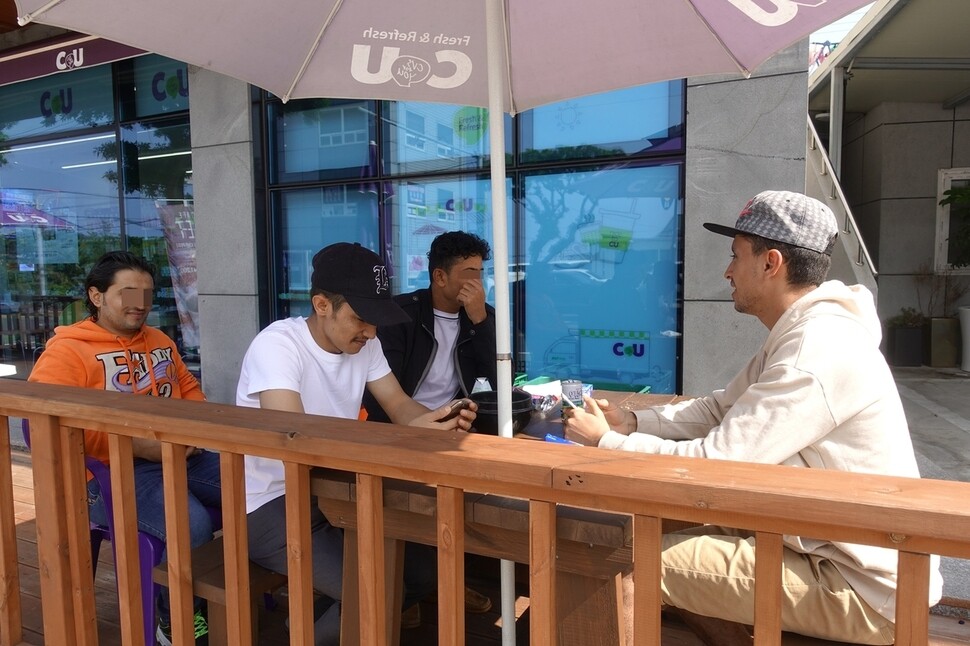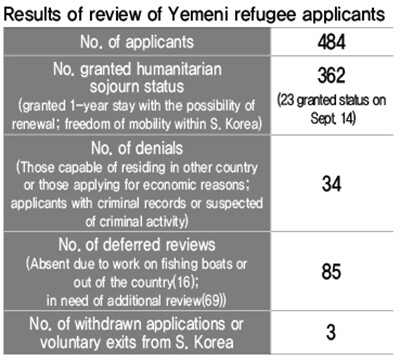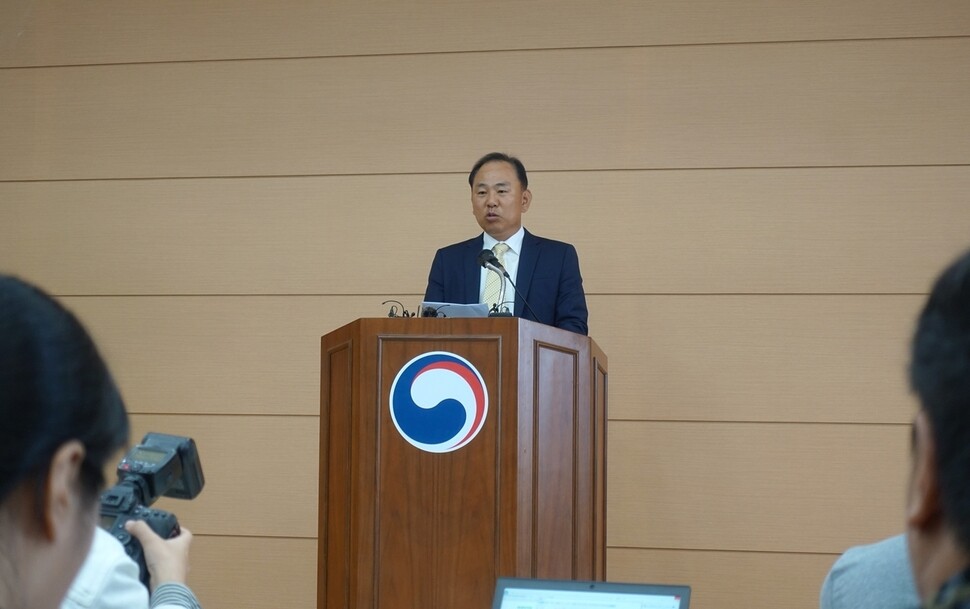hankyoreh
Links to other country sites 다른 나라 사이트 링크
S. Korean government doesn’t recognize single refugee in 2nd review of Yemeni asylum seekers

The South Korean government did not recognize a single refugee in its second review of hundreds of Yemeni asylum seekers who applied for status after arriving on Jeju Island.
The government did permit humanitarian stays for 339 of the asylum seekers. The decision means that humanitarian sojourn status has been granted to 362 of the 481 refugee applicants, including those allowed with the first review on Sept. 14.

The Jeju Office of Immigration (under director Kim Do-gyun) announced review findings on Oct. 17 for 458 of 481 Yemeni nationals who applied for refugee status after arriving on Jeju (including three who withdrew their applications and departed South Korea). The office granted humanitarian sojourn status to 339, denied refugee status for 34, and withheld a review judgment for 85, it said.
“While there weren’t any refugees recognized, this was the first time humanitarian sojourns have been granted to such a large number,” a Ministry of Justice official said.
Yemenis granted a humanitarian sojourn permit will be eligible to live and work in South Korea for one year with the possibility of renewing their status. They will also be allowed to leave Jeju and travel to the South Korean mainland.
“The applicants were not recognized as refugees because they did not meet the conditions for refugee status recognition according to the Refugee Convention and Refugee Act,” the Jeju Office of Immigration explained.
“But in consideration of the current civil war in Yemen, the possibility of detention, and other factors, the decision was made to grant them humanitarian stay permits according to Article 2-2 of the Refugee Act. It has been determined that their lives and physical freedom could be conspicuously infringed upon if they are deported,” the official added.
The 34 individuals who received simple refugee status denials in the review represented cases of individuals who were born and resided continuously in a third country, those with foreign spouses who are capable of traveling to a third country, and those who applied for economic purposes or were deemed as unsuitable for South Korean sojourn status due to criminal charges or other factors, the office explained.

The other 85 included 16 who did not undergo interviews because they were overseas or absent due to work on marine vessels, along with 69 who were deemed to require further review.
The list of Yemeni nationals who did not receive judgments this time reportedly included some who stand some chance of having their refugee status recognized.
“There are some applicants whose refugee status could be recognized, but we are holding off on the review because we need more time to investigate,” explained Jeju Office of Immigration Director Kim Do-gyun.
Addressing rumors of drug use and terrorist activity among applicants
The office also said the majority of reports and claims by South Korean media that Yemenis applying for refugee status had posted messages of support for insurgents or photographs of themselves holding guns or using drugs on social media were false. Drug tests conducted by the office on all applicants over the age of 10 showed positive results for four, all of whom received simple refugee status denials.
In the case of criminal charges, the office said none of the cases were serious enough to warrant immediate expulsion. None of the applicants were found to have been implicated in any terrorist groups.
The office also concluded that there were no major issues with an applicant who posted a photograph of himself carrying a gun.
“The cultural context in Yemen must be taken into account. There was one individual who was photographed holding a gun to show his bravery as a man, and another case of someone who went to a wedding celebration and borrowed someone else’s gun, posting his photograph with it on social media,” Kim explained.
The Yemenis granted humanitarian sojourn status were in high spirits. In particular, they were overjoyed over news that their ban on mainland travel had been lifted.
Hijab, a 22-year-old Yemeni encountered near the Jeju Office of Immigration that afternoon, was beaming after receiving his humanitarian sojourn approval.
“Has the mainland travel ban really been lifted? Does that mean I can go to Seoul?” he asked.
On his wrist, Hijab showed the scars from working for three-months on a fishing boat before recently quitting.
“I worked 12 to 18 hours a day. I couldn’t sleep any more than four hours a day. I couldn’t take it, so I quit,” he said.
Three other Yemenis with him said they also wanted to travel to Seoul or another major city. Of the 214 Yemenis who have currently found work in Jeju, the majority work at fisheries (84), on fishing boats (26), or in restaurants (31).
But the groups Refugee Network and Jeju Residents for the Human Rights of Jeju Refugees called on the Jeju Office of Immigration to “withdraw the baseless refusals of recognition to certain Yemeni asylum seekers and conduct another review that meets global human rights standards.”
By Huh Ho-joon, Jeju correspondent
Please direct comments or questions to [english@hani.co.kr]

Editorial・opinion
![[Column] Park Geun-hye déjà vu in Yoon Suk-yeol [Column] Park Geun-hye déjà vu in Yoon Suk-yeol](https://flexible.img.hani.co.kr/flexible/normal/500/300/imgdb/original/2024/0424/651713945113788.jpg) [Column] Park Geun-hye déjà vu in Yoon Suk-yeol
[Column] Park Geun-hye déjà vu in Yoon Suk-yeol![[Editorial] New weight of N. Korea’s nuclear threats makes dialogue all the more urgent [Editorial] New weight of N. Korea’s nuclear threats makes dialogue all the more urgent](https://flexible.img.hani.co.kr/flexible/normal/500/300/imgdb/original/2024/0424/7317139454662664.jpg) [Editorial] New weight of N. Korea’s nuclear threats makes dialogue all the more urgent
[Editorial] New weight of N. Korea’s nuclear threats makes dialogue all the more urgent- [Guest essay] The real reason Korea’s new right wants to dub Rhee a founding father
- [Column] ‘Choson’: Is it time we start referring to N. Korea in its own terms?
- [Editorial] Japan’s rewriting of history with Korea has gone too far
- [Column] The president’s questionable capacity for dialogue
- [Column] Are chaebol firms just pizza pies for families to divvy up as they please?
- [Column] Has Korea, too, crossed the Rubicon on China?
- [Correspondent’s column] In Japan’s alliance with US, echoes of its past alliances with UK
- [Editorial] Does Yoon think the Korean public is wrong?
Most viewed articles
- 1[Guest essay] The real reason Korea’s new right wants to dub Rhee a founding father
- 2[Column] ‘Choson’: Is it time we start referring to N. Korea in its own terms?
- 3Why Korea shouldn’t welcome Japan’s newly beefed up defense cooperation with US
- 4New AI-based translation tools make their way into everyday life in Korea
- 5Senior doctors cut hours, prepare to resign as government refuses to scrap medical reform plan
- 6Opposition calls Yoon’s chief of staff appointment a ‘slap in the face’
- 7Terry Anderson, AP reporter who informed world of massacre in Gwangju, dies at 76
- 8[Editorial] Japan’s rewriting of history with Korea has gone too far
- 9[Column] Park Geun-hye déjà vu in Yoon Suk-yeol
- 10Will NewJeans end up collateral damage in internal feud at K-pop juggernaut Hybe?